As writers, we know how important it is not only to know and understand our characters, but to know their deepest secrets. Secrets yield invaluable insight into motivations, reasoning, and hidden agendas, as well as the way characters think and rationalize their actions. Though they can surprise us at times, discovering our characters’ secrets—the things they don’t share with the world—will tell us what they’ll do, how they’ll react to setbacks and challenges, and how they’ll treat other people—allowing us to shape a believable story.
Many of us learn about our characters in drafts. Writing freely, without a plan—pantsing, as some writers call it—tapping into our subconscious, we discover interesting insights, gleaned from the details in the draft. But drafting can be time-consuming, and—when the draft doesn’t go anywhere or, conversely, runs in too many directions—churning out drafts can be frustrating, sometimes to the point that we, or I anyway, lose faith in the work.
Though it may not yield plot details, a popular workshop strategy for learning about a character is to dig through his or her trash. What we throw away, the condition items are in when we toss them (past their useful life? Partially used? Brand new?), the emotions driving us to throw something away (pacifiers after a miscarriage? a t-shirt belonging to a former lover?)—as well what we hoard, or keep for sentimental reasons—tells volumes about who we are. Sometimes, in the trash, we hide things we don’t want others to see. Or we toss things impulsively, only to later discover we need them. Often, we toss things in without thinking, making a character’s trash bin a rich entry into his or her subconscious mind.
Here are 7 places to find powerful hints about the habits and nuances of your characters.
7 Places that Will Divulge Your Characters’ Secrets
The fridge
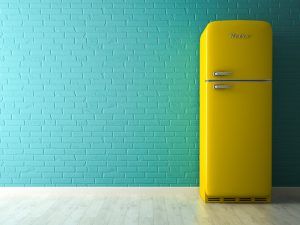 Is the fridge empty or full? Organized or a mess? What does it smell like? Contents: Fruit juices and milk? Or loaded with beer and/or wine? Healthy foods or mostly junk? Do the condiments overwhelm all the other items? Is the food fresh or has it gone bad? Can your character afford the items in her fridge? Are the foods whole, requiring preparation, or takeout? Were the foods purchased for personal consumption or to impress someone? Does she store medicine in her fridge? Or odd items, like nail polish?
Is the fridge empty or full? Organized or a mess? What does it smell like? Contents: Fruit juices and milk? Or loaded with beer and/or wine? Healthy foods or mostly junk? Do the condiments overwhelm all the other items? Is the food fresh or has it gone bad? Can your character afford the items in her fridge? Are the foods whole, requiring preparation, or takeout? Were the foods purchased for personal consumption or to impress someone? Does she store medicine in her fridge? Or odd items, like nail polish?
A Wallet
 How much money is in the wallet? Bills or random change? Quarters for a parking meter? A metro or subway pass? Receipts? Where are receipts from? Stores? Neiman Marcus or Walmart? Four-star restaurants? Or diners? Why did your character keep the receipt/s? Are there any photos? If not, why not? If so, who is in the pictures? Are the subjects alive or dead? What do the images say about the person/people in the photo/s? Are the subjects close to your character—or people your character hasn’t seen in a while, perhaps because they’re estranged? Is there a driver’s license? Is it valid or expired? Issued by the state where your character currently lives? Are there other forms of ID? School ID, for example? Are ID cards real or fake? Does he or she carry other licenses—e.g. to carry a gun?
How much money is in the wallet? Bills or random change? Quarters for a parking meter? A metro or subway pass? Receipts? Where are receipts from? Stores? Neiman Marcus or Walmart? Four-star restaurants? Or diners? Why did your character keep the receipt/s? Are there any photos? If not, why not? If so, who is in the pictures? Are the subjects alive or dead? What do the images say about the person/people in the photo/s? Are the subjects close to your character—or people your character hasn’t seen in a while, perhaps because they’re estranged? Is there a driver’s license? Is it valid or expired? Issued by the state where your character currently lives? Are there other forms of ID? School ID, for example? Are ID cards real or fake? Does he or she carry other licenses—e.g. to carry a gun?
In Real or Virtual Files
 What did your character find important enough to save? What is unexpectedly missing? Are the files organized? Or a hot mess, with random items filed incorrectly—e.g., a store credit in a file for utility bills? Is the file lean or stuffed? Was the file accessible or locked? Is there anything in the file that someone else might want, perhaps badly enough to break in? Is the name on the paperwork in the file the name your character uses? If not, why not? Does everything in the file belong to your character? Was it legitimately obtained?
What did your character find important enough to save? What is unexpectedly missing? Are the files organized? Or a hot mess, with random items filed incorrectly—e.g., a store credit in a file for utility bills? Is the file lean or stuffed? Was the file accessible or locked? Is there anything in the file that someone else might want, perhaps badly enough to break in? Is the name on the paperwork in the file the name your character uses? If not, why not? Does everything in the file belong to your character? Was it legitimately obtained?
A Purse or Messenger Bag
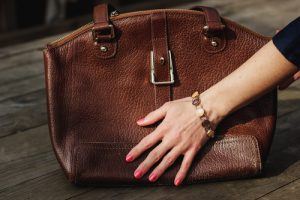 As with the trash, the items we find important enough to carry say a lot about us. Does he or she carry a wallet? Or are cash or bills stuffed in a pocket or lying at the bottom of the bag? A cell phone? What model? Does it belong to your character? If not, where did it come from? A comb or brush? Other items for grooming—e.g. a toothbrush? Gum or breath mints? Paperwork? Bills? Prescription meds? If so, what types of medication? Does he or she use the medication for its intended purposes or for recreation? Is there a prescription for medication? Does the prescription belong to your character? If not, to whom does it belong? Are there any illegal drugs in the bag? A gun? If so, for what purpose? Make and model?
As with the trash, the items we find important enough to carry say a lot about us. Does he or she carry a wallet? Or are cash or bills stuffed in a pocket or lying at the bottom of the bag? A cell phone? What model? Does it belong to your character? If not, where did it come from? A comb or brush? Other items for grooming—e.g. a toothbrush? Gum or breath mints? Paperwork? Bills? Prescription meds? If so, what types of medication? Does he or she use the medication for its intended purposes or for recreation? Is there a prescription for medication? Does the prescription belong to your character? If not, to whom does it belong? Are there any illegal drugs in the bag? A gun? If so, for what purpose? Make and model?
The Glove Compartment and/or Trunk of a Car
 If you’re anything like me, the glove compartment and trunk of your car contain a mishmash of items stored for convenience—in my glove compartment, I keep a bag of jelly beans or Swedish fish; in the trunk, a yoga mat and recyclable grocery bags, for example. Or emergencies, as with car jacks and spare tires, auto manuals and proof of insurance and registration. My glove compartment is stuffed with receipts, pens, pencils, notebooks, maps we no longer use, my trunk a makeshift home for laundry awaiting the dry cleaner, and random items—a hat, a mitten, a sock that fell from an overnight bag. On any given day, there might be an umbrella, spare shoes or boots, a crowbar, a tarp, a bat, a ball, a net.
If you’re anything like me, the glove compartment and trunk of your car contain a mishmash of items stored for convenience—in my glove compartment, I keep a bag of jelly beans or Swedish fish; in the trunk, a yoga mat and recyclable grocery bags, for example. Or emergencies, as with car jacks and spare tires, auto manuals and proof of insurance and registration. My glove compartment is stuffed with receipts, pens, pencils, notebooks, maps we no longer use, my trunk a makeshift home for laundry awaiting the dry cleaner, and random items—a hat, a mitten, a sock that fell from an overnight bag. On any given day, there might be an umbrella, spare shoes or boots, a crowbar, a tarp, a bat, a ball, a net.
For your characters, what do such items mean? And why are they there? Say, these spaces are empty—is your character a neat freak? Or hiding from someone or something?
A safety deposit box
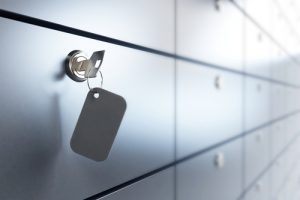 As safety deposit boxes are locked, in general accessible by only the owner and his or her designees, almost anything could be lurking inside—from banking and financial documents to personal items, such as a marriage license or passport or jewelry. Some items stored in a safety deposit box might have sentimental value—photographs, love letters, an award, a bronzed baby shoe, a lock of baby hair, a lost tooth. A character with a flair for the macabre might store a loved one’s ashes in his or her box. Maybe your character stores a gun in his box, or poison, photos for a blackmailing scheme, a victim’s ear, or other tools for a crime.
As safety deposit boxes are locked, in general accessible by only the owner and his or her designees, almost anything could be lurking inside—from banking and financial documents to personal items, such as a marriage license or passport or jewelry. Some items stored in a safety deposit box might have sentimental value—photographs, love letters, an award, a bronzed baby shoe, a lock of baby hair, a lost tooth. A character with a flair for the macabre might store a loved one’s ashes in his or her box. Maybe your character stores a gun in his box, or poison, photos for a blackmailing scheme, a victim’s ear, or other tools for a crime.
In the browser history on a computer
 Considering that we Google pretty much any and everything on our mind, what’s in your characters’ browser history—as well as what’s not there (perhaps because she erased her history so no one could track it?)—can provide a wealth of info and insight. What is he or she interested in? What are his or her hobbies? Is he/she a Google stalker? If so, who does he or she stalk? Did she research diseases? A particular disease – or is he/she a hypochondriac? How many times does a particular search appear? Once? Occasionally? Every day? Several times a day? Does he/she visit porno or other types of “forbidden” sites?
Considering that we Google pretty much any and everything on our mind, what’s in your characters’ browser history—as well as what’s not there (perhaps because she erased her history so no one could track it?)—can provide a wealth of info and insight. What is he or she interested in? What are his or her hobbies? Is he/she a Google stalker? If so, who does he or she stalk? Did she research diseases? A particular disease – or is he/she a hypochondriac? How many times does a particular search appear? Once? Occasionally? Every day? Several times a day? Does he/she visit porno or other types of “forbidden” sites?
Other places to look for clues about your characters’ personality and inner life:
The attic or the back of a shelf; a shoe box or junk drawer; in the drawers in a desk; under the mattress; on a DVR; on a thumb drive; in the medicine cabinet; under clothes or underwear in a bureau.
How do you discover your characters’ secrets?
Downloadable Workbook: Characters’ Secrets Question Prompts
Please enjoy this workbook to help you make some notes about your own characters’ secrets. I hope you find it useful! Right click here to download.




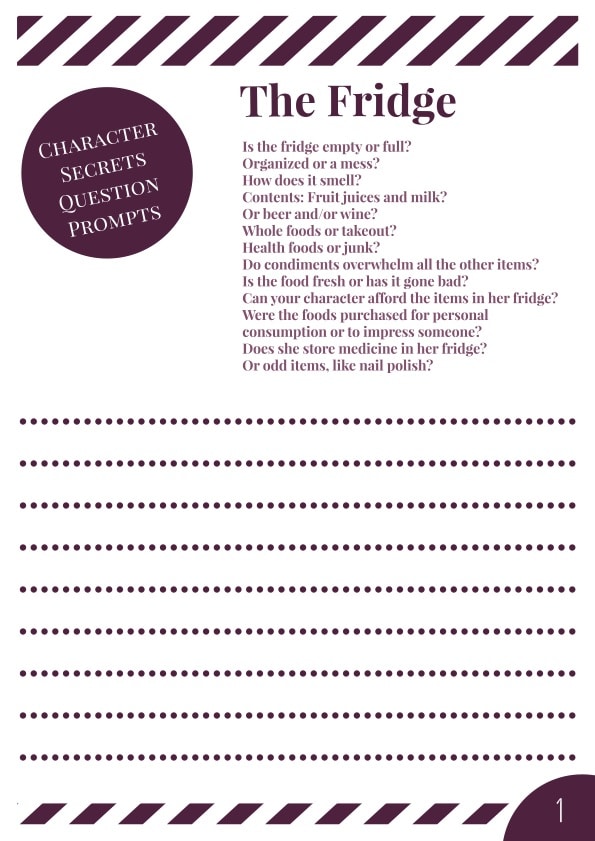
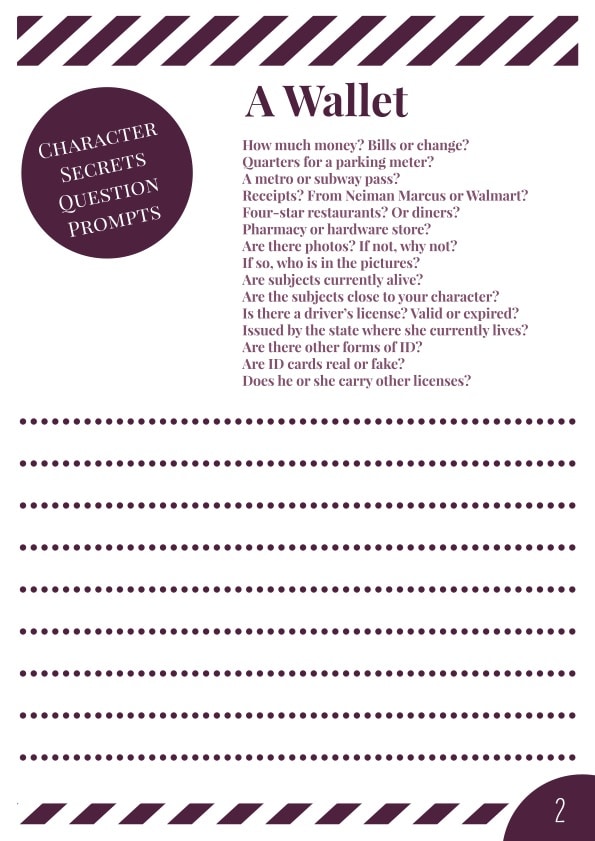
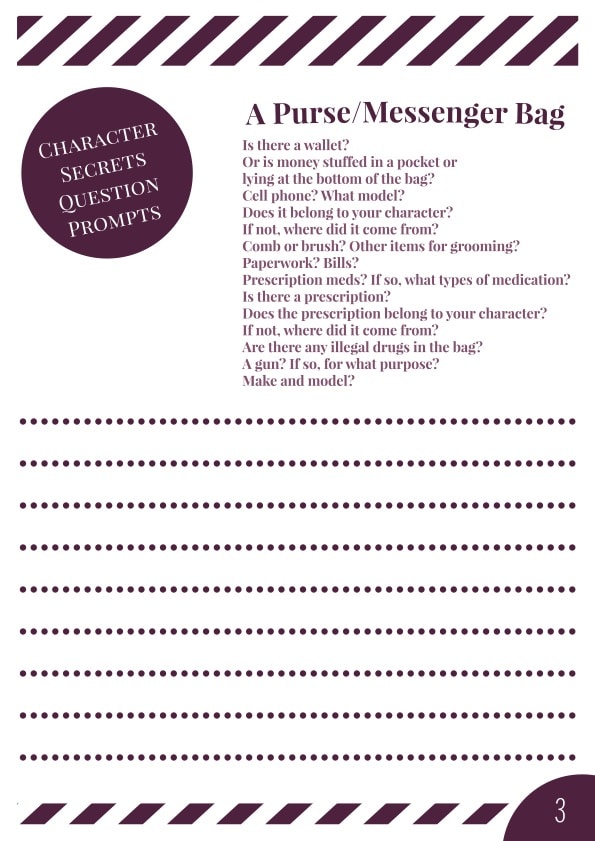
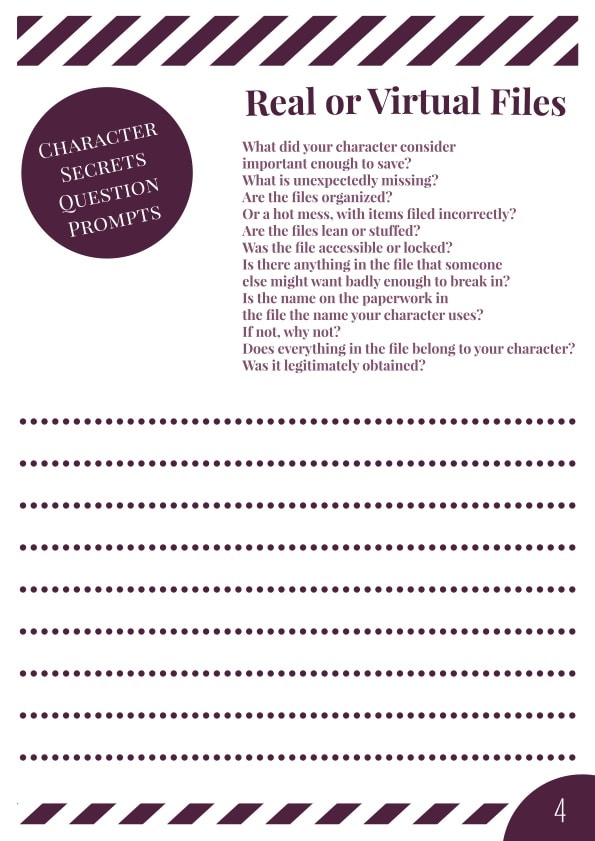
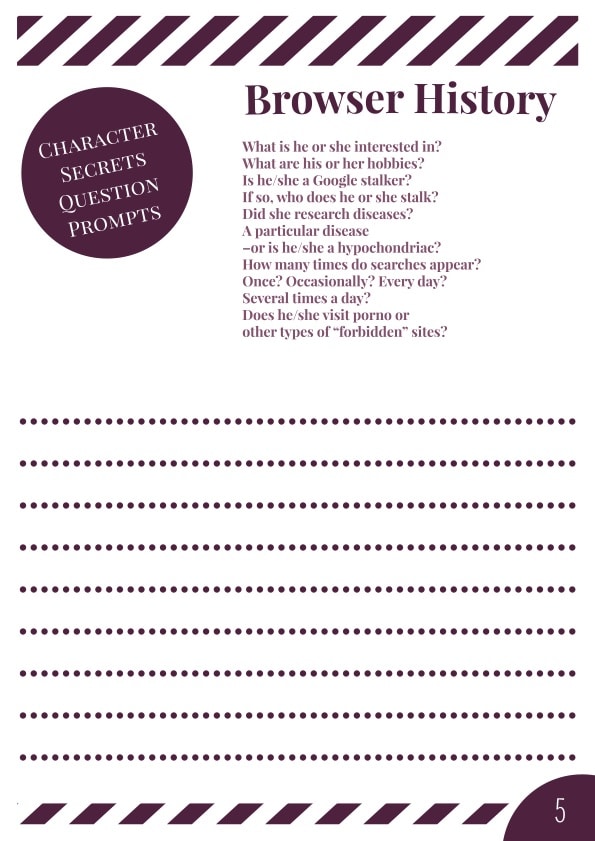
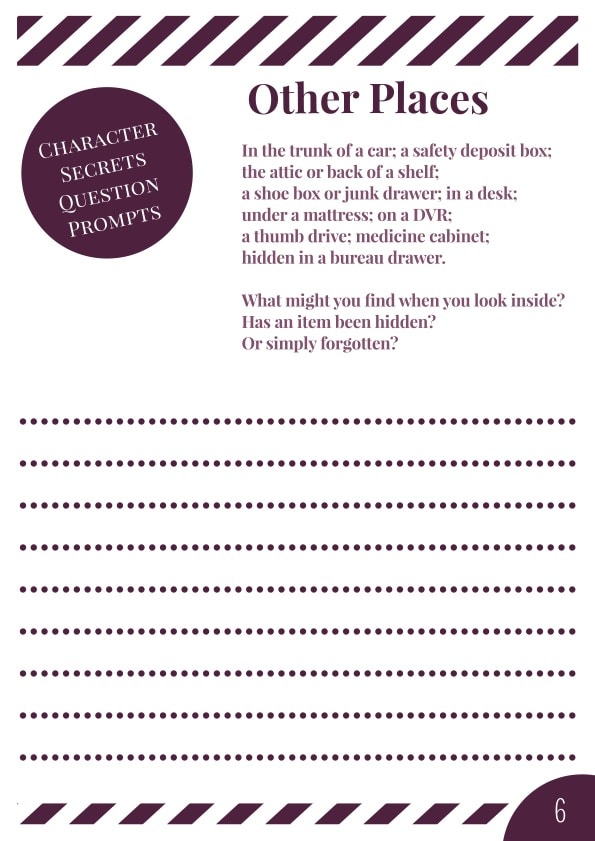
I'd love to hear your thoughts!